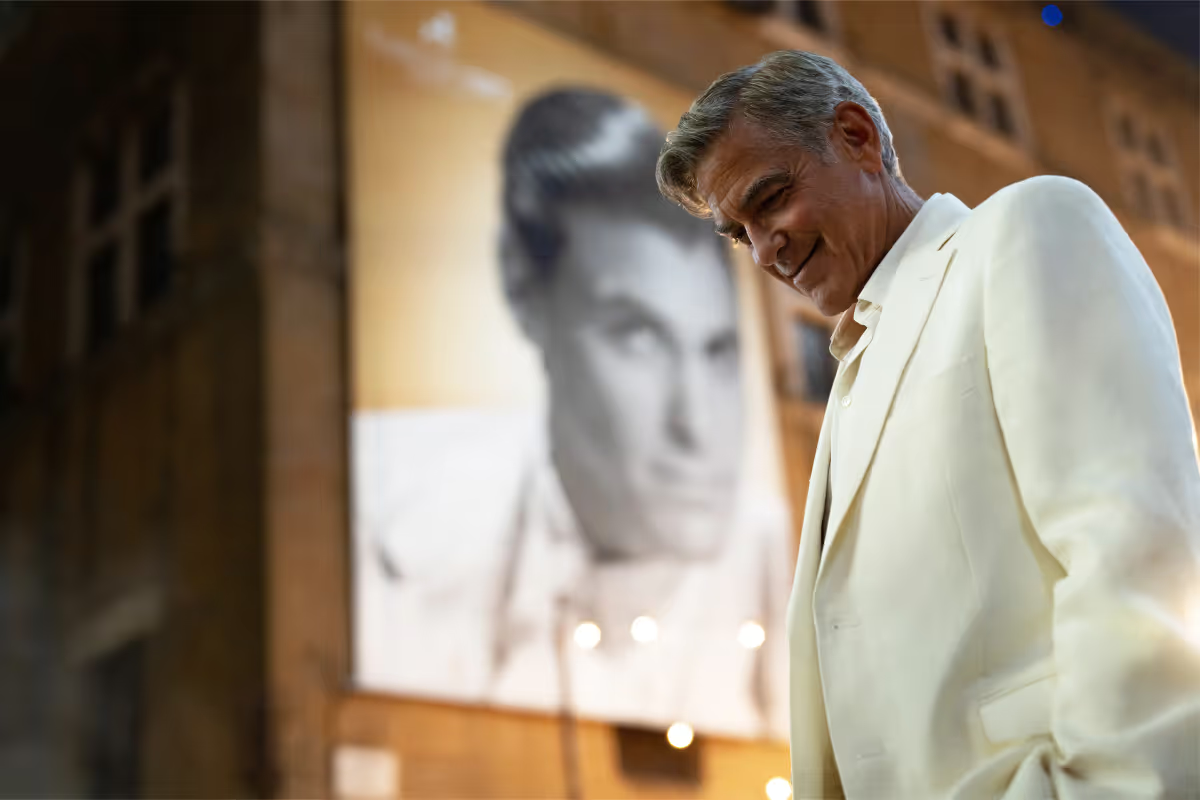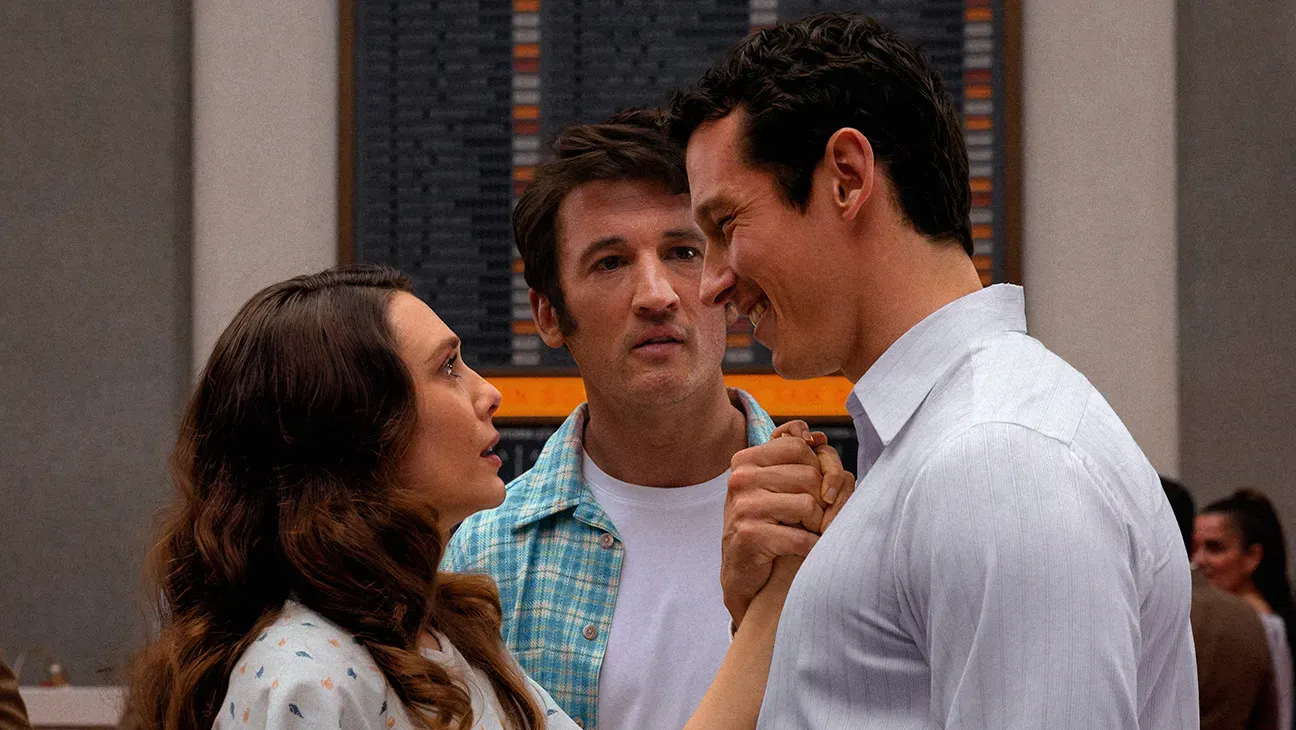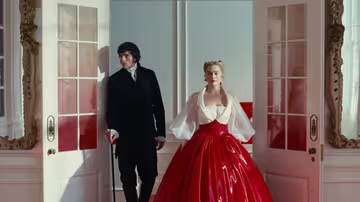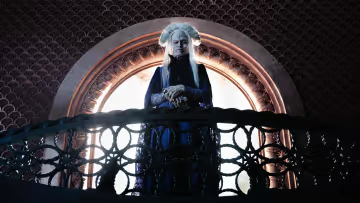In Review: ‘Jay Kelly,’ ‘Eternity’
This week's new releases include a reflective look at stardom and a love story set in the afterlife.

Jay Kelly
Dir. Noah Baumbach
132 min.
No one sheds any tears for how Jay Kelly’s life has turned out. Since scoring his first breakout role after accompanying a pal to an audition over 30 years ago, Kelly has secured a spot as one of the few true movie stars in an era in which such beings have become quite rare. His name can get a movie made. He’s recognized wherever he goes. And he’s earned the respect of both peers and critics. Jay occupies a cultural position not unlike the actor playing him, George Clooney, a connection Noah Baumbach’s film does not shy away from playing up. And even if there’s nothing directly confessional about Jay Kelly—Clooney’s personal life doesn’t seem to have much in common with that of the character—the film takes place in an exclusive space that only a few could really understand. When, talking to some fans, Jay deflects the accusation that he only plays himself with a comment about how people don’t understand the difficulty of such a feat, the film briefly turns into a kind of cinematic hall of mirrors.
Though the film shares a name with the character, Jay Kelly puts two stories at its center. The other belongs to Jay’s manager Ron (Adam Sandler), who’s spent the past few decades learning to anticipate and meet Jay’s needs. If the world knows him at all, it’s as Jay Kelly’s manager, though he’s tried not to make that the entirety of his identity. He’s got a wife (Greta Gerwig) and kids and other clients and he works hard to make sure they all get the attention they need. But Jay doesn’t always make that easy, particularly when he’s in crisis. And, for most of Jay Kelly, Jay’s in the midst of a crisis big enough to consume every crisis that’s preceded it. A seemingly chance encounter reunites Jay with Timothy (Billy Crudup, who makes a deep impression that lasts well after his character leaves the film), the actor whose audition he tagged along to all those years ago. When their meeting takes a sour turn, Jay finds himself questioning every choice he’s ever made. From the outside, it would look like Jay’s done everything right. But Jay’s on the inside and knows better.
The Reveal is a reader-supported newsletter dedicated to bringing you great essays, reviews and conversation about movies. If you are not paid subscriber, we would love for you to click this button below and join our community.
Co-written by Baumbach and Emily Mortimer (who has a fun supporting role as Jay’s personal hair stylist), Jay Kelly offers two complementary depictions of men forced to reckon with where life has taken them as they approach the back half of middle age. Jay lives a kind of Hollywood twist on Ingmar Bergman’s Wild Strawberries. Dropping everything to follow his younger daughter Daisy (Grace Edwards) to Europe (first to France then to Italy, where he’s decided to accept an award he’d initially refused), Jay finds himself walking in and out of memories of his youth. For Ron, the experience is much less lyrical, one that involves juggling Jay’s whims, demands at home, and the attention of Jay’s publicist Liz (Laura Dern), for whom the trip becomes a chance to revisit a long-ago episode in their past.
There’s nothing particularly surprising about Jay Kelly or its insights into the perils of fame, but it plays a familiar song extremely well. Movie stars like Clooney may always end up playing variations on their screen persona—that’s kind of the definition of a movie star—but his performance explores how much range and depth a persona can contain. Aboard a train bound for Tuscany, he calms the chaos created by his presence with effortless charm, but his exchanges with Daisy and his older daughter Jessica (Riley Keough) find him performing for the one audience on which that charm no longer works.
As the trip progresses, Jay’s entourage starts to fall away, leaving him increasingly isolated and letting Clooney play the emotions of a man who understands, maybe for the first time, why others might want to leave him alone. It’s a fine movie star performance, complemented throughout by Sandler’s more down-to-earth turn. (As Jay’s father, Stacy Keach also does standout work.) Though Baumbach lays the groundwork for a satire of Hollywood excess, he instead delivers a familiar but elegant depiction of successful men reflecting on choices they can’t undo, the damage created by those decisions, and the limited time they have left to make right what they still can. —Keith Phipps
Jay Kelly opens in select theaters this weekend. It will premiere on Netflix on December 5th.


Eternity
Dir. David Freyne
114 min.
When Larry (played as an older man by Barry Primus) chokes on a pretzel at a gender reveal party in the opening moments of Eternity, he soon discovers death means trading one set of problems for another. Barry doesn’t even have time to lament his fate, or express regret about leaving behind his wife Joan (played as an older woman by Betty Buckley), who’s been given a terminal cancer diagnosis, before he’s confronted with a new set of questions: Why is he on a train? Who are these other passengers? And why is he (now played by Miles Teller) in the body he had at the age of 35? Answers begin arriving after he exits to find himself in the Junction, a vast luxury hotel / convention floor where he’s greeted by Anna (Da’Vine Joy Randolph), his “Afterlife Coordinator.” In short, she tells him he has a week to choose the afterlife in which he’ll spend eternity. Also, he needs to choose well because he’ll be there forever and he’ll have to make the decision without Joan and hope she finds his way to him—unless he wants to stick around by taking a menial job, but what kind of weirdo would do that?
Unfortunately for Larry, the film provides an answer to that question: Joan’s first husband Luke (Callum Turner), who died fighting in Korea not long after they wed and has hung around the Junction for 67 years waiting for the day she shows up. That leaves Joan (now played by Elizabeth Olsen), who arrives at the Junction just in time to catch Larry on his way to a beach-themed afterlife of surf and sand, with a choice: Does she want a second chance at the passion of her youth by reuniting with a man whose loss she felt the rest of her life? Or does she want to resume a marriage of many largely happy (if complaint-filled) decades?
Working from a script he co-wrote with Patrick Cunnane, director David Freyne (Dating Amber) keeps the film breezy without forgetting the weightiness of Joan’s decision and the choice between two strikingly different varieties of love it represents. Yet one of the film’s greatest strengths is its refusal to oversimplify the matter and a script that allows Turner, Teller, and Olsen to make their characters more than mere types. Maybe Luke isn’t quite the person Joan’s idealized. Maybe Larry has sides of himself Joan hasn’t seen, even after 60+ years of marriage. Maybe Joan has her own shortcomings, however much both men might love her. (A fun touch: Teller and Olsen's delivery and body langauge provide occasional reminders they’re playing octogenarians, no matter what their bodies now look like.) Randolph and John Early (who plays Joan’s Afterlife Coordinator Ryan) lock into the film’s whimsical yet bittersweet tone and the central conceit of sales reps trying to push particular eternities on potential clients remains funny from start to finish. (“All the fun of the Middle Ages, but without the leprosy!”)
If, much like Joan, the film runs into some trouble deciding where to go, it remains a charming and ultimately moving comedy. Eternity never quite plumbs the thematic depths of obvious inspirations like A Matter of Life and Death and Defending Your Life, but maybe that’s fitting for a film filled with characters less interested in exploring the Big Questions than in finding a quiet place and the right person with whom to share it, whoever that might be. —Keith Phipps
Eternity opens in limited release this weekend before expanding.





Discussion